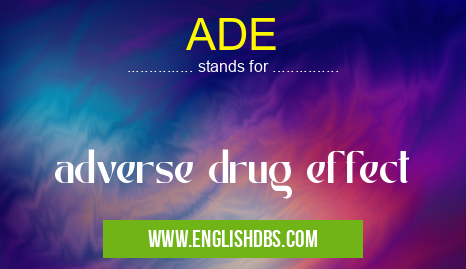What does ADE mean in BRITISH MEDICINE
ADE stands for Adverse Drug Effect. ADE is a broad term used to describe any ill effect associated with the use of a medication. This includes any negative reaction an individual may experience when taking a particular drug, such as drowsiness, nausea, or even serious dangerous consequences like liver damage or life-threatening allergic reactions. ADE is typically used in medical contexts and refers to the negative effects of drugs on the body or mind.

ADE meaning in British Medicine in Medical
ADE mostly used in an acronym British Medicine in Category Medical that means adverse drug effect
Shorthand: ADE,
Full Form: adverse drug effect
For more information of "adverse drug effect", see the section below.
Definition
ADE (Adverse Drug Effect) is defined as any undesired side effect caused by taking medication. It includes any negative reaction that a person may experience after taking a certain drug and can range from minor symptoms such as dizziness or drowsiness to more serious conditions such as organ damage or life-threatening allergic reactions.
Effects of ADE
Common adverse drug effects include skin rashes, headaches, nausea, vomiting, diarrhea, dizziness, fatigue, confusion and changes in blood pressure. Other potential effects include liver damage, increased risk of heart attack and stroke, abnormal heart rate and rhythm changes and even death. In some cases, ADEs can be unpredictable and life-threatening.
Prevention of ADE
One way to reduce the risk of experiencing ADEs is for individuals to be aware of all the potential risks associated with taking medications they are prescribed by their doctors. For example, it is important to understand what types of medications you should not take together or if you are allergic to any specific medications before beginning treatment. Furthermore, it is important to follow all instructions from your doctor regarding dosage amounts and timing when taking medications in order to reduce the chances of experiencing an adverse reaction.
Essential Questions and Answers on adverse drug effect in "MEDICAL»BRITMEDICAL"
How might I be affected by an Adverse Drug Effect?
Adverse drug effects, also known as negative side effects, refer to any undesired or unintended reactions to a medication. Depending on the drug, negative side effects can range from mild symptoms such as nausea or headaches, to more serious illnesses or even death in some cases. It is important to speak with your doctor about any potential adverse drug effects that your medication may cause.
What should I do if I experience an Adverse Drug Effect?
If you feel you are experiencing an adverse drug effect after taking medication, it is important to contact your healthcare provider immediately. Your doctor will be able to provide advice on how you should proceed and what steps should be taken to mitigate the adverse effect.
What are examples of common Adverse Drug Effects?
Common adverse drug effects vary depending on the type of medication that is being taken; however some of the most common include nausea, headaches, dizziness, dry mouth and fatigue. More serious reactions may include allergic reactions such as a rash or difficulty breathing, seizures and even liver damage in some cases.
Are there long-term risks associated with Adverse Drug Effects?
In some cases, the long-term risks associated with adverse drug effects can be severe and life-threatening such as organ damage or even death in rare cases. Speak with your doctor about any potential long term complications that may arise due to the use of certain medications.
Are there ways for me to avoid having an Adverse Drug Effect?
One way to reduce the likelihood of experiencing an adverse drug effect is to only take medications prescribed by a physician who knows your full medical history and any other medications you may already be taking. Additionally following directions closely and paying attention for any signs of adverse effects is also important when using new medications.
What are some possible complications of having an Adverse Drug Effect?
Possible complications arising from this condition depend on the severity of the reaction and which type of medication was being taken at the time; however they typically include symptoms such as severe pain or discomfort, difficulty breathing or swallowing, chest tightening or rapid heartbeat and confusion. In extreme cases organ failure can occur due to prolonged exposure resulting from an undiagnosed case of an adverse drug reaction.
What happens if I experience multiple Adverse Drug Effects at once?
If multiple adverse drug effects occur simultaneously, it could indicate a more serious underlying issue such as allergies or intolerance for certain substances; therefore it is best not to take any additional medications until speaking with your doctor first so they can assess if there are alternative treatment options available.
Are there tests available for detecting potential Adverse Drug Effects before they happen?
Yes – certain tests exist which screen for possible allergens before taking new medications so patients can review their own personal risk associated with existing drugs they may already be taking in order determine if further precautions need to be taken beforehand.
Is it possible for someone's body chemistry to make them predisposed towards having more frequent occurrences of an Adverse Drug Effect?
Yes – someone's individual body chemistry can play a role in how their body reacts when exposed to certain chemicals; particularly substances found within medicines which each person's system processes differently depending on age and health status.
Final Words:
In conclusion, understanding what ADE stands for and recognizing its potential effects can help individuals make informed decisions about what medications are right for them. By being aware of possible adverse reactions that could occur from taking certain drugs individuals can better manage their own health care while reducing their vulnerability to potentially harmful effects.
ADE also stands for: |
|
| All stands for ADE |
